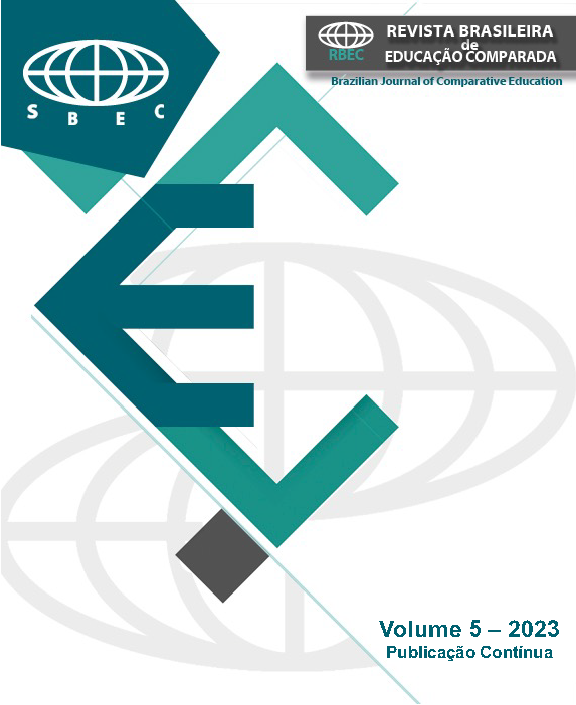Abstract
The Brazilian Comparative Society’s history, aged 40, evokes the unbearable lightness of being, associating the freedom’s lightness and the facts’ burden. Outlining this continuous tension, we point out the initial goal of opening windows and doors to the world, as a means to overcome an introjected educational system, as well as a neo-colonial cosmopolitism in order to point out another perspective to the sciences of education. A survey in 2013 detected 97 articles on comparative and international education published in 1999-2014. Nevertheless, we have been surprised by an initial estimate of around 840 digitally published papers in 2019-Jun. 2023. This boom mirrors the globalization context, comparative evaluations and incentives to competition for efficiency, not necessarily equality. This paper finishes with questions about numerous quantitative webs we are in, included in assembly lines of “scientific production” as industrial goods, instead of deeply reflecting on meaning and implications. Would we be puppets in a giant show of lightness and weight’s simulacra and simulation?References
Baudrillard, J. (1991). Simulacros e simulação. Relógio d’Água.
Bauman, Z. (2021). Modernidade líquida. Zahar.
Beck, U. (2011). Sociedade de risco: Rumo a uma outra modernidade. Editora 34.
Bray, M., Adamson, B., & Mason, M. (Orgs.) (2015). Pesquisa em educação comparada: Abordagens e métodos. Liber Livro; Cátedra UNESCO de Juventude, Educação e Sociedade; Universidade Católica de Brasília.
Castells, M. (2002). Fim de milênio (3ª ed). Paz e Terra.
Dubet, F. (2020). O tempo das paixões tristes. Vestígio.
Durkheim, É. (1963). As regras do método sociológico (3ª ed). Nacional.
Freud, S. (2011). O mal-estar na civilização. Penguin; Companhia das Letras.
Gomes, C. (2015). Educação comparada no Brasil: esboço de agenda. Revista Brasileira de Estudos Pedagógicos. 46(243), 243–258.
https://dx.doi.org/10.1590/52176-6681/359313453
Gomes, C., & Pimentel, G. (2020). Afinal, a educação viaja bem? Revista Brasileira de Educação Comparada, 2, e020001. https://doi.org/10.20396/rbec.v2i.12229
Han, B.-C. (2019). Sociedade do cansaço (2ª ed., 3ª reimpr.). Vozes.
Kundera, M. (2008). A insustentável leveza do ser. Companhia de Bolso.
Le Breton, D. (2018). Desaparecer de si: uma tentação contemporânea. Vozes.
Mauss, M. (2012). Essai sur le don: Forme et raison d’échange dans les sociétés archaïques. Presses Universitaires de France.
Morin, E. (2021). Ciência com consciência (20ª ed.). Bertrand Brasil.
Mussot, P. (2019). Le temps de l’État-Entreprise: Berlusconi, Trump, Macron. Fayard.
Piketty, T. (2022). Uma breve história da igualdade. Bertrand.
Rosa, H. (2019). Aceleração: A transformação das estruturas temporais na Modernidade. Editora UNESP.
Schultz, T. (1961). Investment in human capital. American Economic Review, 51(3), 1-17.
Stiglitz, J., Sen, A., & Fitoussi, J.-P. (2009). The measurement of economic performance and social progress revisited [Document du Travail de l’OFCE, N. 2009-33]. Sciences-po.fr. Disponível em: https://www.ofce.sciences-po.fr/pdf/dtravail/WP2009-33.pdf.
Vitaud, L. (2022). En finir avec la productivité: Critique féministe d’une notion phare de l’économie et du travail. Payot.

This work is licensed under a Creative Commons Attribution-NonCommercial-ShareAlike 4.0 International License.
Copyright (c) 2023 Candido Alberto Gomes


